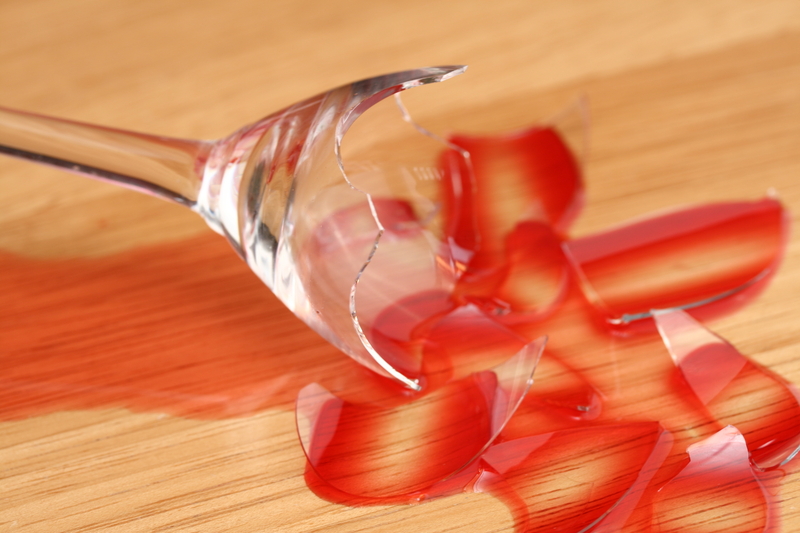Banish Animal Aromas for a Fresher, Cleaner Home
Posted on 03/06/2025
Banish Animal Aromas for a Fresher, Cleaner Home
Are pet odors making your home less inviting? For countless pet owners, maintaining a clean, fresh-smelling house can feel like a never-ending battle. While we adore our furry friends, their natural aromas, accidents, and dander can seep into carpets, upholstery, and even the air--prompting the need for effective strategies to eliminate animal odors for good.
In this comprehensive guide, you'll learn proven methods to banish animal smells, discover pet odor removal tips, and explore products and routines that deliver a permanent, noticeable difference. By the end, you'll know exactly how to achieve a fresher, cleaner home--while still sharing space with your beloved pets!
Understanding Animal Odor Origins in the Home
Before diving into remedies, it's essential to understand where pet odors come from and why they can be so stubborn. Recognizing the sources enables you to develop targeted, lasting solutions.
Main Sources of Pet Odors
- Pet Dander: Tiny flecks of skin shed by cats, dogs, birds, and other animals carry proteins that cause lingering smells--and sometimes spark allergies.
- Accidents and Urine: Even properly trained pets may occasionally have accidents, leaving behind persistent ammonia-based odors.
- Wet Fur: Water can activate bacteria on pet fur, resulting in the notorious "wet dog smell."
- Litter Boxes and Cages: Uncleaned litter trays or enclosures emit strong, distinctive animal aromas.
- Beds and Toys: Soft materials invisible trap oils, drool, fur, and more.

Why Removing Pet Odors is Crucial
Beyond comfort, eliminating animal odors supports a healthier environment:
- Improved Air Quality: Odors often indicate airborne particles or bacteria that can impact respiratory health.
- Protection of Surfaces: Urine and drool can damage fabrics, carpet, and flooring if not treated quickly.
- A More Inviting Home: Freshness creates a pleasant space for residents and guests alike.
Ready to transform your home's atmosphere? Let's explore actionable steps to remove, prevent, and control pet odors--permanently.
7 Essential Steps to Banish Animal Aromas for Good
1. Start with a Deep Cleaning Routine
Routine cleaning removes surface dirt, dander, and oils--critical for animal odor removal. Focus on these key areas:
- Vacuum carpets and furniture daily. Use a vacuum with a HEPA filter to capture the finest allergens and fur. Pay attention to pet resting spots and under furniture.
- Launder pet bedding weekly. Wash blankets, beds, and soft toys on hot cycles to kill odor-causing bacteria.
- Wipe hard surfaces. Regularly clean walls, floors, and baseboards with pet-safe cleaners to dislodge dried sneezes or oils.
- Don't forget drapes and curtains! These fabric surfaces often harbor pet odors, especially in rooms where animals lounge.
2. Target Accidents Quickly and Effectively
Prompt, proper cleanup is essential when accidents happen. Here's how to neutralize odors fast:
- Blot, don't rub: Use paper towels to soak up as much liquid as possible.
- Apply an enzymatic cleaner: Enzyme-based solutions break down proteins in urine or feces--destroying the source of the smell rather than just masking it.
- Steam clean carpets and upholstery: For persistent stains, rent a carpet cleaner or use a professional service with pet-specific solutions.
Tip: Never use ammonia-based cleaners on pet accidents--the smell mimics urine and can encourage repeat offenses!
3. Master the Litter Box and Cage Challenge
- Scoop daily: Remove waste from litter trays or cages every day to keep aromas at bay.
- Change litter weekly: Completely replace cat litter--and clean the box with hot water and mild soap (avoid strong scents that discourage use).
- Avoid non-clumping litters for odorous pets: They trap less moisture, leading to faster odor buildup.
- Consider covered or high-sided boxes: These contain odors and mess, reducing aroma diffusion.
4. Prioritize Air Purification
Odors don't just linger on surfaces--they permeate your home's air. Combat airborne pet smells with:
- HEPA Air Purifiers: Capture dander, fur, and odor molecules around the clock.
- Ventilation: Open windows regularly for airflow, or use exhaust fans in problem areas.
- Activated Charcoal: Natural and highly absorbent, charcoal bags or filters soak up unwanted scents.
5. Groom Your Pets Thoroughly and Regularly
A clean pet is a fresher-smelling pet! Routine grooming prevents the buildup of oily residue and dander.
- Brush daily: Especially for shedding breeds--this removes dead hair and distributes oils evenly.
- Bathe as needed: Use pet-friendly shampoos. For animals that dislike baths, consider waterless sprays or wipes formulated to neutralize pet odors.
- Dental hygiene: Oral health impacts breath and body odor--try dental chews, toys, or brushing.
6. Refresh Pet Belongings
Toys, collars, beds, and leashes absorb fur, saliva, and skin oils. Wash or replace them regularly:
- Hard toys: Hand-wash with hot, soapy water weekly.
- Fabric items: Launder in a machine using unscented detergent.
- Food and water bowls: Clean daily to reduce invisible bacteria growth.
7. DIY Natural Remedies for Stubborn Pet Odors
If you prefer a chemical-free approach, these time-tested home solutions can aid in neutralizing animal scents:
- Baking Soda: Sprinkle over carpets, let sit for at least 30 minutes, then vacuum. Baking soda absorbs and neutralizes stubborn odors.
- White Vinegar: Mix one part vinegar with one part water and mist onto affected areas as a natural deodorizer for hard surfaces (spot test first).
- Lemon Juice: Its acidity breaks down smells on washable surfaces--wipe down cages or crates.
- Essential Oils: Use only pet-safe varieties (like lavender), diluted, in diffusers for a fresh touch. Never use undiluted oils on pets directly.
Advanced Solutions for Persistent Odors
Tackling the Toughest Pet Odor Challenges
Some homes or rooms experience chronic animal odors that resist standard cleaning. For these situations, consider:
- Professional Carpet & Upholstery Cleaning: Companies offer deep extraction and deodorizing treatments not achievable by home methods.
- Repainting Walls: If odors have penetrated drywall or paint, sealing with a stain-blocking primer and repainting may be necessary.
- Replacing Flooring: Severely affected carpets or pads sometimes require removal to eradicate deeply embedded smells.
- Ozone or Hydroxyl Generators: Used by professionals, these machines neutralize odors in the air and on surfaces. Note: Rooms must be vacant during ozone treatment.
Modern Innovations: Pet-Specific Deodorizers
New technologies offer potent, safe options to eliminate animal aromas while protecting your family and pets:
- Enzyme Sprays: Continuously break down organic waste at a molecular level.
- Probiotic Cleaners: Use "good bacteria" to outcompete and destroy odor-causing microbes.
- Odor-Blocking Paint Additives: These transform walls into passive air filters, absorbing smells for years.
Building Odor Prevention into Your Everyday Routine
Establishing Habits for a Consistently Fresh Home
Proactive, daily habits are your best defense against future odor issues:
- Assign responsibilities: Rotate cleaning duties among household members for litter trays, feeding areas, and pet bedding.
- Designate pet zones: Easier-to-clean areas or washable mats help contain fur and odors.
- Keep up with pet health: Address medical issues (UTIs, skin conditions) promptly--many illnesses worsen animal odors.
- Regular vet visits: Ensure your animal companions are healthy and odor-free.

Frequently Asked Questions: Banishing Animal Smells from Your Home
How do I make my house not smell like animals?
For a pet-odor-free home, pair daily cleaning with targeted odor removal products. Focus on affected areas, ventilate, and launder fabrics and pet gear regularly.
What neutralizes pet odor?
Enzymatic cleaners, baking soda, and activated charcoal are the most effective at neutralizing (not masking!) pet odors in homes. Combine these with air purification for best results.
Can I use essential oils around pets?
Some essential oils are unsafe for dogs or cats and can cause illness if inhaled or ingested. Always use pet-safe, diluted oils, and never apply oils directly to your pet.
Why does my house still smell like animals even after cleaning?
Odors may persist if bacteria remain beneath surfaces, in air ducts, or in soft furnishings. Deep-clean carpets, upholstery, and air systems, and try enzymatic products for a fresher, cleaner home.
Conclusion: Rediscover Freshness in Your Home
Living with pets doesn't mean accepting animal aromas in your home. By following the step-by-step methods above, you'll enjoy all the rewards of pet companionship--without compromising on clean, inviting air and surfaces. Remember, banishing pet odors is an ongoing process. Consistency is your ally!
Ready to enjoy a fresher, cleaner, pet-friendly home? Calculate your cleaning strengths, try some professional tricks, and keep your beloved animals comfortable by putting these methods to work. With the right combination of science, routine, and love, pet odors no longer stand a chance!
Latest Posts
Unlock the potential of efficient window cleaning techniques
Achieve Spotless uPVC Window Frames with These Tips
Become a Cleaning Guru with These Tips





